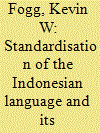| Srl | Item |
| 1 |
ID:
142639


|
|
|
|
|
| Summary/Abstract |
Yolŋu people living in northeast Arnhem Land regularly celebrate their connections with the Macassan trepangers from Indonesian Sulawesi in storytelling, art and music. The history of this contact is well known in academic literature, and these stories of Macassan contact are told regularly by Yolŋu people to tourists visiting northeast Arnhem Land. This paper explores the impact that hearing stories about the Macassans from one Yolŋu family's tourism business had on a group of Australian Indonesian language teachers, visiting as part of an Endeavour Language Teaching Fellowship. It draws on ideas related to telling and hearing stories and argues that these particular stories enabled the teachers to make powerful connections: with each other and with Australia's histories and geographies. The paper also explores the ways in which the teachers went on to become storytellers themselves, using stories to make connections in their students' learning.
|
|
|
|
|
|
|
|
|
|
|
|
|
|
|
|
| 2 |
ID:
139605


|
|
|
|
|
| Summary/Abstract |
In the 1940s and 1950s, several organs of the newly independent Indonesian state oversaw the standardisation of the Indonesian national language. In this process, Western-oriented bureaucrats pushed the language towards European normativity, significantly decreasing the influence of Arabic. While this reform carried symbolic meaning, the practical ramifications on Indonesian orthography, spelling, and word selection also carried real, non-symbolic effects on the accessibility of this language to Indonesian Islamic leaders. Standardising orthography to use the Roman alphabet rendered many Muslims illiterate in a language they had been using for decades. Choices in word selection and spelling limited the Islamic meanings that the new language could carry, thus impacting how Muslims could use the national language for religious and other purposes. Indonesian linguistic reform carried serious social and political consequences in addition to the symbolic meanings often studied.
|
|
|
|
|
|
|
|
|
|
|
|
|
|
|
|